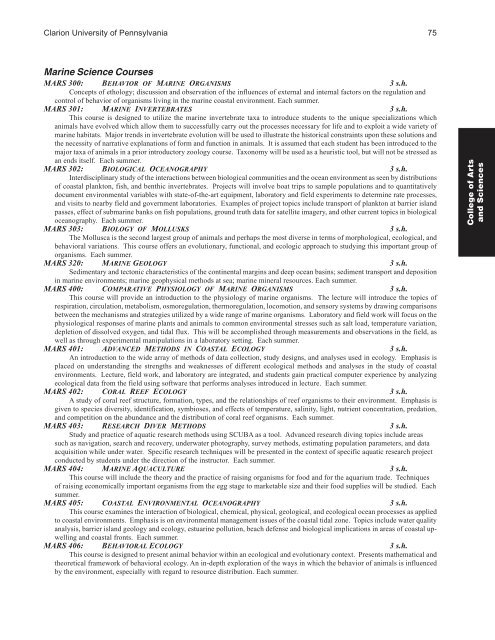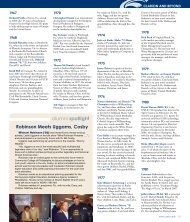Undergraduate - Clarion University
Undergraduate - Clarion University
Undergraduate - Clarion University
You also want an ePaper? Increase the reach of your titles
YUMPU automatically turns print PDFs into web optimized ePapers that Google loves.
<strong>Clarion</strong> <strong>University</strong> of Pennsylvania 75<br />
Marine Science Courses<br />
MARS 300: BEHAVIOR OF MARINE ORGANISMS 3 s.h.<br />
Concepts of ethology; discussion and observation of the influences of external and internal factors on the regulation and<br />
control of behavior of organisms living in the marine coastal environment. Each summer.<br />
MARS 301: MARINE INVERTEBRATES 3 s.h.<br />
This course is designed to utilize the marine invertebrate taxa to introduce students to the unique specializations which<br />
animals have evolved which allow them to successfully carry out the processes necessary for life and to exploit a wide variety of<br />
marine habitats. Major trends in invertebrate evolution will be used to illustrate the historical constraints upon these solutions and<br />
the necessity of narrative explanations of form and function in animals. It is assumed that each student has been introduced to the<br />
major taxa of animals in a prior introductory zoology course. Taxonomy will be used as a heuristic tool, but will not be stressed as<br />
an ends itself. Each summer.<br />
MARS 302: BIOLOGICAL OCEANOGRAPHY 3 s.h.<br />
Interdisciplinary study of the interactions between biological communities and the ocean environment as seen by distributions<br />
of coastal plankton, fish, and benthic invertebrates. Projects will involve boat trips to sample populations and to quantitatively<br />
document environmental variables with state-of-the-art equipment, laboratory and field experiments to determine rate processes,<br />
and visits to nearby field and government laboratories. Examples of project topics include transport of plankton at barrier island<br />
passes, effect of submarine banks on fish populations, ground truth data for satellite imagery, and other current topics in biological<br />
oceanography. Each summer.<br />
MARS 303: BIOLOGY OF MOLLUSKS 3 s.h.<br />
The Mollusca is the second largest group of animals and perhaps the most diverse in terms of morphological, ecological, and<br />
behavioral variations. This course offers an evolutionary, functional, and ecologic approach to studying this important group of<br />
organisms. Each summer.<br />
MARS 320: MARINE GEOLOGY 3 s.h.<br />
Sedimentary and tectonic characteristics of the continental margins and deep ocean basins; sediment transport and deposition<br />
in marine environments; marine geophysical methods at sea; marine mineral resources. Each summer.<br />
MARS 400: COMPARATIVE PHYSIOLOGY OF MARINE ORGANISMS 3 s.h.<br />
This course will provide an introduction to the physiology of marine organisms. The lecture will introduce the topics of<br />
respiration, circulation, metabolism, osmoregulation, thermoregulation, locomotion, and sensory systems by drawing comparisons<br />
between the mechanisms and strategies utilized by a wide range of marine organisms. Laboratory and field work will focus on the<br />
physiological responses of marine plants and animals to common environmental stresses such as salt load, temperature variation,<br />
depletion of dissolved oxygen, and tidal flux. This will be accomplished through measurements and observations in the field, as<br />
well as through experimental manipulations in a laboratory setting. Each summer.<br />
MARS 401: ADVANCED METHODS IN COASTAL ECOLOGY 3 s.h.<br />
An introduction to the wide array of methods of data collection, study designs, and analyses used in ecology. Emphasis is<br />
placed on understanding the strengths and weaknesses of different ecological methods and analyses in the study of coastal<br />
environments. Lecture, field work, and laboratory are integrated, and students gain practical computer experience by analyzing<br />
ecological data from the field using software that performs analyses introduced in lecture. Each summer.<br />
MARS 402: CORAL REEF ECOLOGY 3 s.h.<br />
A study of coral reef structure, formation, types, and the relationships of reef organisms to their environment. Emphasis is<br />
given to species diversity, identification, symbioses, and effects of temperature, salinity, light, nutrient concentration, predation,<br />
and competition on the abundance and the distribution of coral reef organisms. Each summer.<br />
MARS 403: RESEARCH DIVER METHODS 3 s.h.<br />
Study and practice of aquatic research methods using SCUBA as a tool. Advanced research diving topics include areas<br />
such as navigation, search and recovery, underwater photography, survey methods, estimating population parameters, and data<br />
acquisition while under water. Specific research techniques will be presented in the context of specific aquatic research project<br />
conducted by students under the direction of the instructor. Each summer.<br />
MARS 404: MARINE AQUACULTURE 3 s.h.<br />
This course will include the theory and the practice of raising organisms for food and for the aquarium trade. Techniques<br />
of raising economically important organisms from the egg stage to marketable size and their food supplies will be studied. Each<br />
summer.<br />
MARS 405: COASTAL ENVIRONMENTAL OCEANOGRAPHY 3 s.h.<br />
This course examines the interaction of biological, chemical, physical, geological, and ecological ocean processes as applied<br />
to coastal environments. Emphasis is on environmental management issues of the coastal tidal zone. Topics include water quality<br />
analysis, barrier island geology and ecology, estuarine pollution, beach defense and biological implications in areas of coastal upwelling<br />
and coastal fronts. Each summer.<br />
MARS 406: BEHAVIORAL ECOLOGY 3 s.h.<br />
This course is designed to present animal behavior within an ecological and evolutionary context. Presents mathematical and<br />
theoretical framework of behavioral ecology. An in-depth exploration of the ways in which the behavior of animals is influenced<br />
by the environment, especially with regard to resource distribution. Each summer.<br />
College of Arts<br />
and Sciences
















